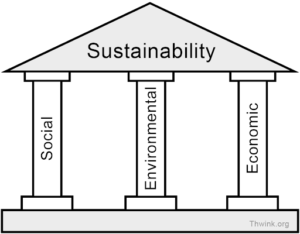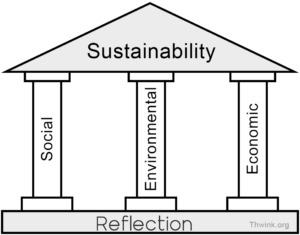Group Members: Shakira Browne, Analiese Vasciannie, Sean McAneny, Tayler Thompson, Taylor VanTine, Evelyn Mendez, Sakshi Kumar
“My job is to notice…and to notice that you can notice.”–Dionne Brand
According to the U.S. National Environmental Policy Act, the goal of sustainability is to “create and maintain conditions, under which humans and nature can exist in productive harmony, that permit fulfilling the social, economic, and other requirements of present and future generations.” Keeping future generations in mind suggests an environmental component to sustainability. We can identify the three pillars of sustainability, then, as social, economic, and environmental. Within each of those domains, sustainability is seeking productive harmony and attempting to limit the harm that is done. In other words, the goals of one pillar should be attainable without compromising the goals of the other two. When there is tension between the pillars, careful reflection is required on the part of those individuals, or organizations, striving for sustainability. Because reflection is so essential to sustainable practice, we believe that reflection should be added to the definition of sustainability. In the metaphorical structure of the pillars holding up a roof of sustainability, reflection is the foundation.


We believe this new framework of sustainability is at the core of our reading. Leah Penniman’s Farming While Black encourages a closer connection to the environment and its resources and demands that we pay attention, or reflect critically, on our practices as learners. Thus, we believe this text to a be a “life preserver,” as Dr. McCoy says, because it tethers us to key concepts of sustainability and reflection. The concept of reciprocity is one that Penniman links to sustainability in chapter three, writing, “believing that the universe is governed by laws of reciprocity, we sacrificed just as we hoped to receive” (Penniman 53). Through Penniman’s statement, we decided to focus on the society that we live in today and the existing mutual benefits that are expected from many relationships and situations that we are involved with and how we influence one another with our individual experiences. This rule would seem to apply to relationships among individuals, like those in Octavia Butler’s “Bloodchild;” there is, in fact, “risk…in dealing with a partner” (Butler 26). When entering into relationships we must acknowledge the reciprocity lest we forget that what we put into our relationships we are bound to receive. Zooming out to our relationship with the environment, we must remember that, just as we impact the environment, we will be impacted by the effects of our own climate change. Penniman attends to this as well saying, “when we first came to this land, we were very excited about the potential for renovating an existing overgrown swamp into a pond for swimming and irrigation. Intuitively, we could tell that the swamp held a concentration of spiritual energy, so we felt that we needed to ask permission before moving earth and disturbing the ecosystem” (Penniman 54). The idea of asking the environment for permission acknowledges the fact that nature is just as alive as we are and we should respect it as such. Penniman suggests that the environment provides natural gifts to us and we as human beings don’t always acknowledge them as gifts, taking them for granted. This is why the food diary project was so important. By logging our food intake, we paid more attention to the products of our earth and began to reflect critically on our relationship to the environment. This is all in line with the course epigraph from Dionne Brand: “my job is to notice…and to notice that you can notice.” We touched base with the idea that we don’t always notice what nature does for us, but by engaging with Farming While Black, visiting the heating plant, and engaging in a food diary project, we began to take more notice.
Chapter 10 of Ralph Ellison’s Invisible Man describes the experience of an unnamed narrator navigating employment at a paint company, though there is an underlying narrative of (un)sustainability. When the narrator starts his job producing the paints, he is baffled by the process, which involves adding black graduate to enhance the whiteness of paint. He asks his boss, Mr. Kimbro, what is in the graduate to which Mr. Kimbro replies, “‘You damn right I know… You just do what you’re told!’” The narrator does not have all the information and those who do are holding it back from him, discouraging his questions. The blindness of this production process may be interpreted as comparable to the process of food production and consumption in America. We often eat food mindlessly, without noticing where it came from or the process it went through to become available to us. For example, students living on campus at SUNY Geneseo are typically required to purchase a meal plan, meaning that they get all of their food through Campus Auxiliary Services (CAS). This is one example of blind consumption because it would be incredibly difficult for students to identify the source of most CAS foods. Typically, we get our meals from student workers, who likewise do not have all the information about the foods history, because the process is so obfuscated. Shakira has worked for CAS, and shared their experience opening boxes that were labeled “Vegetables” without additional information. If we were to look behind the curtain, we would see a typical process that involves farm, packaging/processing, retail/grocery, and then table. It’s expansive and involves significant resources to accomplish. These instances of miscommunication and misinformation have ramifications in the social realm of sustainability because production is often obscured. The food that is ingested has a significant impact on human health, so foods may do harm if they are incorrectly prepared or have harmful ingredients that accumulate, such as hormones in meat. A reflective, informed producer and consumer has more power over their own well being and role in the process. In Invisible Man, we see how being uninformed can cause a person to be simply a cog in a machine, which is easily replaceable. The business was able to continually replace the lowest level of laborers throughout the union strike, which in one sense was economically sustainable for the company because it allowed them to operate at lower operation costs. However, this may be considered economically unsustainable for the individuals involved, as they easily lose their source of income, and for the community as unemployment is increased. Additionally, there are significant social issues associated with using black, college-educated individuals as strikebreakers when the white employees protest wages. It sets up disparity in status based on race, which impacts broader structures.
In Big Machine, the Washburn Library is an institutional structure and the Dean and Unlikely Scholars are some of the individuals who comprise this structure. In a literal sense, the Library has been economically sustained by “two and a half-buried trunks of Spanish gold coin” which Judah Washburn brings with him from California to Vermont (LaValle 91). This contributes to the availability of food, nice suits, and the architecture of the Library itself. In another sense, the Library is sustained by the Scholars who work hard to achieve an unidentifiable goal. The Scholars are not paid for their work, but they always return due to their role as instruments of a greater project. Both Ricky and the Dean acknowledge this when Ricky is finally invited up to Dean’s office. The Dean asks Ricky to look at a painting of Saint Jerome and “notice” the smaller details within the larger picture. (LaValle 93) Ricky is asked to identify with something in the painting and comes to the conclusion that he (along with the other Unlikely Scholars) embody the quill Saint Jerome is holding, or what the Dean refers to as “an instrument.” (Lavalle 94). The labor of each individual Unlikely Scholar is so crucial to the framework of the Washburn Library that The Library is socially sustained by the participation and education of them. Without their labor and cooperation with the Dean and the larger institution, the Library cannot function. Ricky notices this, too, after one of the many moments in which he finds himself questioning how the Washburn Library operates. He concludes, “I felt convinced that the Dean couldn’t leave the Library, the same way my brain can’t abandon my body.” (LaValle 83). In this way, the Dean’s work (and that of the Unlikely Scholars) is integral. As for the environmental sustainability, the individuals of the Library protect their environment by never abandoning their vague assignments.The fear of leaving their responsibilities at the Library exemplifies how sustainability subconsciously influences the actions of individuals in even the most obscure situations. Reflection is crucial in the workings of Big Machine. Since such little information is provided to them, the Unlikely Scholars, but Ricky especially are constantly questioning why they are at the Library. Ricky is unsure about what it is that his job entails and often reflects on this confusion. In a broader sense, this reflection is literally what allows the novel to progress. From the moment the novel opens, Ricky’s reflections about his life and purpose are what gets him to take the bus to Vermont, beginning his journey.
In Call and Response, the poems, “Beware: Do Not Read This Poem” and “Booker T. and W.E.B.” demonstrates the power of institutions to impact the actions of individuals. The theme can relate to the social pillar of sustainability and the idea of participation. Lines 19-29 reads,“The hunger of this poem is legendary/ it has taken in many victims/ back off from this poem/ it has drawn in yr feet…nobody can hear you can they?” (1658). Politics and poetry go together as in the people who make labels of higher power can impact the consumer’s finances by saying one thing but it appearing to be another. This concept is further demonstrated by the Booker T. Washington and W.E.B. DuBois conversation in which people give up their own voice by relying on institutional power. Such participation within different disciplines can create conflict, yet the end goal seeking some form of knowledge.
From deeply considering each of our course texts and experiences, including the food log and trip to heating plant, we have reaffirmed the importance of reflection in sustainable practice. These exercises are important in our education because it makes the invisible visible and provides us access to knowledge that would otherwise have been taken for granted. One of the epigraphs for our course reads “my job is to notice…and to notice that you can notice” (Dionne Brand). This quote reflects with how we carry on with our daily lives working towards a goal that may fulfill a certain purpose. It is important to remember that the roles we play in society not only impact our lives, but the lives of those who exist within the same space as us.
